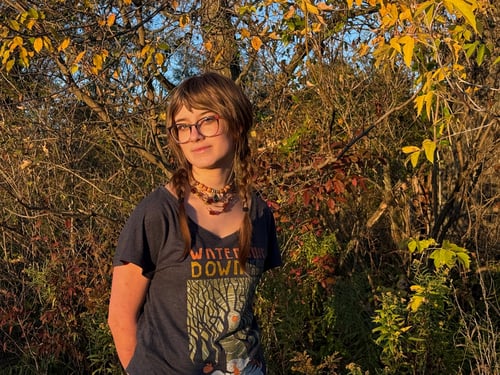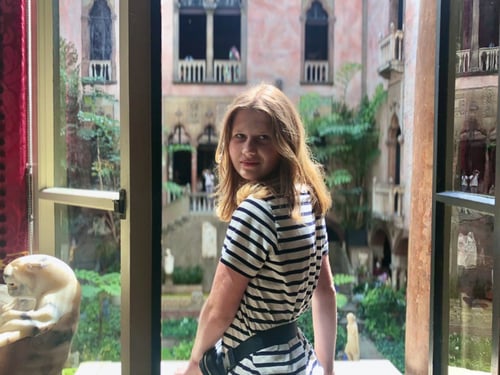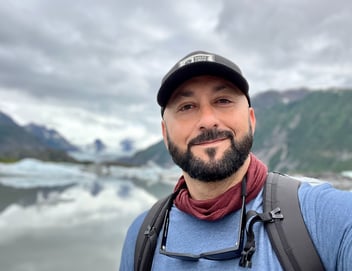Who are the poets whose striking words arrested the attention of Guest Judge Aimee Nezhukumatathil? Meet Anna, Sophia, and Anastasiya, the teen writers who took away the winning prize for our Nature Poetry Competition.
Winner: Anna Elyssa Cerezo (Philippines), age 17

Read the winning piece here!
Guest Judge Aimee Nezhukumatathil celebrates your poem, sharing: “I love how it takes an animal often ridiculed and gathers instead tenderness and hunger, salt and memory, and pulls them into the same breath.” What inspired you to write about this animal in your winning poem?
I have always found the quote “Beauty Will Save the World” from Fyodor Dostoyevsky objectionable. I thought, “If beauty could save the world, it’s unfortunate that I was an oblivious blobfish.”
But over time, I learned from a marine biology book that the blobfish isn’t really ugly. It’s just what we see when we drag it out of its world. In the deep, it is whole. Soft, buoyant, perfectly shaped for where it belongs.
That was when Dostoyevsky’s line finally made sense to me. Beauty, as he meant it, wasn’t a pretty face or perfect dress. It was the kind of truth that strips away our distorted surface view and lets us see something – or someone – as they really are.
I wanted to create a poem that showcases the blobfish as a carrier of memories and ultimately, our humanity. I think about how nostalgia, as fragile as it is, often reminds us why life is worth living, and how the blobfish encapsulates that feeling as it shrugs weightlessly in its dark kingdom, utterly unbothered by our shallow verdicts.
What do you like to read, and how has it influenced your beautiful writing style?I want to begin by sharing that I first read Oceanic by Aimee Nezhukumatathil when I was fifteen, just beginning my journey into poetry. This book, along with Creatures of the Deep by Erich Hoyt, deeply inspired me by blending my growing fascination with marine biology and my enduring love for literature. Even now, I strive to merge science and poetry in my writing because this combination offers readers something fresh, something that resonates both intellectually and emotionally.
I don’t limit myself to any one genre, author, or style when choosing what to read; to do so would be a disservice to my growth as a writer. My favorites range widely from Fight Club by Chuck Palahniuk to Goodbye Tsugumi by Banana Yoshimoto—because what I truly love is reading itself, and that passion naturally fuels my own writing.
As for my style, I aim to reflect both my unique voice and the profound interconnectedness we share with others. I like to think of my process as “Frankensteining” the style of my favorite writers. When a piece moves me deeply, I ask what it is I love most about it: the vivid specifics, subtle nuances, clever wit, or elegant structure. Then, I try to incorporate those elements into my own work.
Runner-Up: Sophia Mendham (United States), age 17

Read the runner-up piece here!
As for advice, I would definitely recommend teen writers and everyone in general to cultivate and grow a curiosity for everything, because fostering an interest in the ‘how’ and the ‘why’ and the ‘is’ and the ‘was’ produces a new state of observance and engagement with your surroundings that inherently inspires thought/experience. Entering this perspective opens up new avenues of thought related to nature simply by proxy, they are the things that we see when we chose to pay attention. I think this can be the means of inspiration for everyone, scientists, artists, and writers alike.
The structure of my poem is mostly incidental, it is really just a mishmash of scattered thoughts or ideas I have that I record and slowly amalgamate into something semi-cohesive. The mangrove portion was inspired by a documentary on the Everglades National Park, the ‘girl in an oyster’ was inspired by a sculpture in an antique shop, and the ‘chalk or gospel’ line was taken from a dream about a beach I visited. I think doing this helps me synthesize of a larger collection of inspiration into an experience that speaks to all of them.Best Peer Review: Anastasiya Sankevich (United States), age 17
 Read the best peer review here!
Read the best peer review here!





